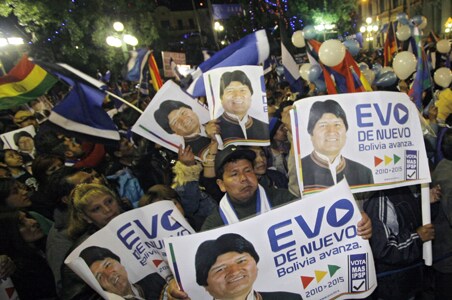
AFP Image
La Paz:
Bolivian President Evo Morales has easily won a second term in elections, according to early exit polls that showed him with a strengthened mandate to pursue socialist reforms deeply dividing his country.
Various polls suggested Morales, a 50-year-old former coca farmer who became Bolivia's first indigenous president in 2006, attracted 62-63 per cent of the vote.
His nearest rival, conservative former governor Manfred Reyes Villa, was credited with just 23-24 per cent, the polls said on Sunday.
Official results based on a nearly complete tally were expected tomorrow. They were expected to confirm voter intention surveys that predicted a landslide win for Morales.
If that is the case, the United States can also expect continued fraught relations with Morales, who last year threw out the US ambassador and the US Drug Enforcement Administration after accusing them of undermining his government.
What was less clear was the number of seats Morales's Movement Towards Socialism party grabbed in the 157-seat Congress in the legislative part of the ballot.
Already dominant in the chamber of deputies, the party was looking to also seize control of the senate from the conservative opposition and secure a two-thirds majority that would deliver unfettered political freedom to Morales.
Much of Morales's support came from Bolivia's indigenous majority, which makes up 60 per cent of the population.
Various polls suggested Morales, a 50-year-old former coca farmer who became Bolivia's first indigenous president in 2006, attracted 62-63 per cent of the vote.
His nearest rival, conservative former governor Manfred Reyes Villa, was credited with just 23-24 per cent, the polls said on Sunday.
Official results based on a nearly complete tally were expected tomorrow. They were expected to confirm voter intention surveys that predicted a landslide win for Morales.
If that is the case, the United States can also expect continued fraught relations with Morales, who last year threw out the US ambassador and the US Drug Enforcement Administration after accusing them of undermining his government.
What was less clear was the number of seats Morales's Movement Towards Socialism party grabbed in the 157-seat Congress in the legislative part of the ballot.
Already dominant in the chamber of deputies, the party was looking to also seize control of the senate from the conservative opposition and secure a two-thirds majority that would deliver unfettered political freedom to Morales.
Much of Morales's support came from Bolivia's indigenous majority, which makes up 60 per cent of the population.
Track Latest News Live on NDTV.com and get news updates from India and around the world

